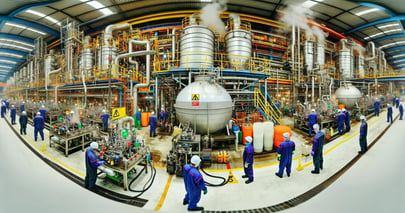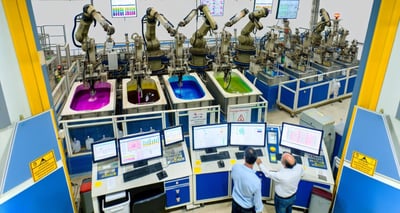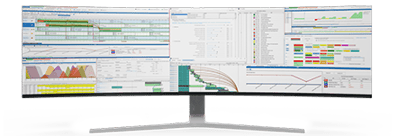Robotic Process Automation for Order Fulfillment Scheduling in High-volume Manufacturing with Batch Processes
Optimizing production and order fulfillment processes is crucial to maintaining a competitive edge. As an Operations Director in a chemical manufacturing facility, you understand the complexities and challenges involved in managing high-volume production with batch processes. One of the key areas where technology can make a significant impact is order fulfillment scheduling, and Robotic Process Automation (RPA) has emerged as a game-changer in this regard.
In this blog, we will explore the benefits of using RPA for order fulfillment scheduling and how it can be seamlessly integrated with your existing ERP, SCM, and MES systems. Specifically, we will delve into the integration between PlanetTogether, a leading manufacturing planning and scheduling software, and some of the most widely used enterprise systems like SAP, Oracle, Microsoft, Kinaxis, and Aveva.

High-volume Chemical Manufacturing with Batch Processes
High-volume chemical manufacturing with batch processes is a complex operation. Managing production orders, batch recipes, raw material availability, equipment constraints, and delivery commitments requires meticulous planning and scheduling. Any delay or error in the scheduling process can lead to production bottlenecks, missed deadlines, increased costs, and customer dissatisfaction.
Traditional scheduling methods often rely heavily on manual intervention, which is time-consuming and prone to human errors. This is where RPA steps in to revolutionize order fulfillment scheduling.

The Role of Robotic Process Automation (RPA)
Robotic Process Automation is a technology that uses software robots or bots to automate repetitive and rule-based tasks. In the context of order fulfillment scheduling, RPA can significantly enhance efficiency and accuracy by:
Automating Data Entry: RPA bots can extract data from various sources, including your ERP, SCM, and MES systems, and input it into scheduling software like PlanetTogether. This eliminates the need for manual data entry and reduces the risk of errors.
Scheduling Optimization: RPA can be programmed to continuously analyze data and make real-time adjustments to the production schedule. It can consider factors such as equipment availability, raw material availability, and customer orders to optimize scheduling.
Alerts and Notifications: RPA can send alerts and notifications to relevant personnel when exceptions or disruptions occur in the production process. This enables proactive problem-solving and minimizes downtime.
Reporting and Analytics: RPA can generate detailed reports and analytics, providing valuable insights into production efficiency, resource utilization, and order fulfillment performance.
Benefits of RPA in Order Fulfillment Scheduling
Now that we understand the role of RPA in order fulfillment scheduling, let's explore the specific benefits it offers to chemical manufacturing facilities:
Increased Efficiency: RPA eliminates the need for manual data entry and repetitive tasks, allowing your team to focus on more strategic activities. This leads to faster and more accurate scheduling.
Cost Reduction: By optimizing scheduling and minimizing production bottlenecks, RPA can help reduce operational costs and enhance overall profitability.
Enhanced Accuracy: RPA bots are designed to work with precision, reducing the likelihood of errors that can occur with manual scheduling. This results in improved product quality and customer satisfaction.
Scalability: RPA can easily adapt to changes in production volume or complexity. Whether you're dealing with a surge in demand or introducing new products, RPA can handle it.
Improved Compliance: In the highly regulated chemical industry, compliance with safety and environmental standards is paramount. RPA can help ensure that scheduling decisions align with regulatory requirements.


Integrating RPA with PlanetTogether and ERP, SCM, MES Systems
To fully leverage the power of RPA for order fulfillment scheduling, it's essential to integrate it with your existing enterprise systems, including ERP, SCM, and MES. This integration ensures seamless data flow and coordination across all facets of your manufacturing operation.
Here's how RPA can be integrated with some of the leading enterprise systems:
Integration with SAP: SAP is a widely used ERP system in the chemical industry. RPA can extract data from SAP, such as customer orders, inventory levels, and production schedules, and feed this information into PlanetTogether. It can also update SAP with scheduling changes made by PlanetTogether, ensuring data consistency.
Integration with Oracle: Oracle's ERP solutions offer comprehensive manufacturing and supply chain capabilities. RPA can connect with Oracle to retrieve data on production orders, bills of materials, and inventory status, facilitating accurate scheduling in PlanetTogether.
Integration with Microsoft Dynamics: Microsoft Dynamics provides ERP and SCM solutions that can benefit from RPA integration. RPA can automate data synchronization between Microsoft Dynamics and PlanetTogether, streamlining the scheduling process.
Integration with Kinaxis RapidResponse: Kinaxis is known for its supply chain planning platform. RPA can complement Kinaxis by automating data transfer between Kinaxis and PlanetTogether, ensuring real-time visibility into supply chain dynamics.
Integration with Aveva: Aveva offers MES solutions that play a critical role in manufacturing operations. RPA can connect Aveva's MES system with PlanetTogether to ensure that scheduling decisions align with shop floor realities.
Robotic Process Automation has the potential to revolutionize order fulfillment scheduling in high-volume chemical manufacturing with batch processes. By automating repetitive tasks, optimizing schedules, and seamlessly integrating with ERP, SCM, and MES systems like SAP, Oracle, Microsoft, Kinaxis, and Aveva, RPA can enhance efficiency, reduce costs, and improve accuracy.
As an Operations Director, embracing RPA for order fulfillment scheduling can position your facility for greater success and competitiveness in a dynamic industry. It's an investment in efficiency, accuracy, and customer satisfaction that can pay dividends in the long run.
The key to successful integration is selecting the right RPA platform and working with experienced RPA developers who can customize the automation process to fit your specific needs. This might involve creating custom scripts or workflows to bridge the gap between your enterprise systems and PlanetTogether.
Are you ready to take your manufacturing operations to the next level? Contact us today to learn more about how PlanetTogether can help you achieve your goals and drive success in your industry.